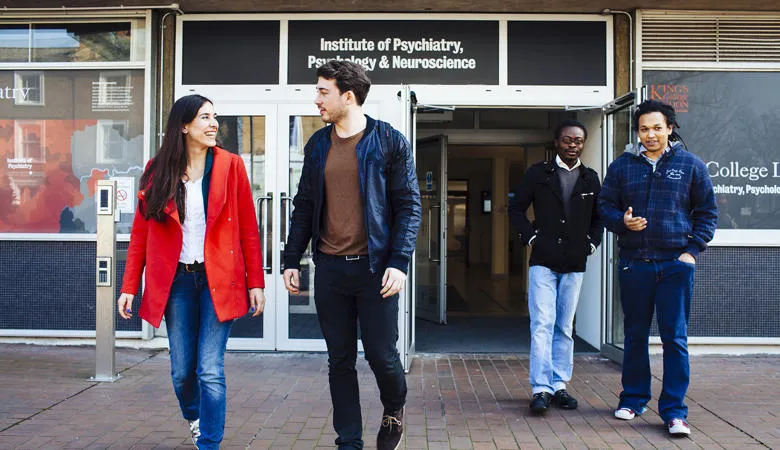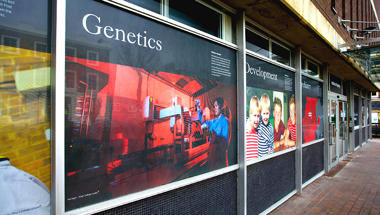Find a supervisor
Search through a list of available supervisors.

Neuroimaging at the IoPPN is world-renowned. The Department of Neuroimaging is embedded in the Centre for Neuroimaging Sciences, a joint venture between the IoPPN and the South London and Maudsley NHS Foundation Trust (SLaM). The Centre provides, under one roof, an interdisciplinary research environment that combines the development of high resolution structural, functional and metabolic mapping techniques, with expertise in the definition, diagnosis and treatment of neurological and psychiatric disorders. By early 2018 the CNS will house 2 research-dedicated MRI scanners plus a 3rd used jointly for research and clinical studies; all three scanners, along with another in the adjacent NIHR / Wellcome Trust King's Clinical Research Facility, have a field strength of 3T, and are capable of performing functional, spectroscopic, anatomical and pathological mapping techniques. A 9.4T pre-clinical MRI system is based at the James Black centre on the Denmark Hill Campus.
Current research projects span neurodegeneration, epilepsy, stroke, pain, psychosis, affective disorders, developmental disorders and normal brain function, using a battery of neuroimaging techniques which include perfusion, diffusion, functional and structural imaging. Complementary research in imaging physics and analysis supports these applications, and the PhD program supports both image acquisition and analysis, and application driven, research projects.
Basic scientific research is also performed in models of neuropsychiatric disease, again using a diverse array of neuroimaging techniques, including pharmacological MRI and spectroscopy techniques. In conjunction with non-MR methods such as microscopy and autoradiography, this multifaceted approach enhances our understanding of the pathophysiological mechanisms underlying disease and informs the development of novel therapeutic interventions. In addition, improved understanding of the biological processes that underlie MR signal changes advances the crucial role of MR in non-invasive assessment of neuropsychiatric disease. Again, the PhD program supports research projects in all these area.
Key benefits of this course:
Access to state-of-the-art imaging equipment.
Interaction with internationally recognised researchers in a wide range of neuroimaging topics.
Excellence in both technical and applied neuroimaging research and development.
Strong partnerships with hospitals, industry and other research centres.
Access to rich and varied clinical populations.
PhD students have access to a wide range of educational resources, ranging from neuroimaging specific lectures from the Department’s MSc Neuroimaging to transferable skills and career development resources at the KCL level.
Opportunities to be involved in tutorials and laboratory demonstrations for undergraduate and taught post-graduate students.
A list of publications, research grants and researchers from the department of Neuroimaging can be found online here.
Related courses:
The Department of Neuroimaging sits within the Division of Neuroscience at the IoPPN. Related courses include:
The tuition fees below are for the first year of the course. These tuition fees may be subject to additional increases in subsequent years of study, in line with King’s terms and conditions.
UK Tuition Fees 2025/26
Full time tuition fees: £8,500 per year
Part time tuition fees: £4,250 per year
International Tuition Fees 2025/26
Full time tuition fees: £32,400 per year
Part time tuition fees: £16,200 per year
UK Tuition Fees 2026/27
Full time tuition fees: £9,100 for the first year
Part time tuition fees: £4,550 for the first year
International Tuition Fees 2026/27
Full time tuition fees: £34,700 for the first year
Part time tuition fees: £17,350 per year

Home to the Institute of Psychiatry, Psychology & Neuroscience.
Graduate research students work closely with their supervisors and enjoy regular meetings to discuss their progress. They also liaise with other members of staff with relevant research interests and are encouraged to attend and participate in departmental research presentations and other Institute seminars. There is a full induction for new graduate students on commencing their studies. Each full-time graduate research student is allocated their own workspace and computer; facilities for part-time students can be arranged according to their needs.
Training courses run by the department, the Institute or through the Graduate School can be utilised as required to provide training in a wide variety of topics, from transferable skills to academic areas directly relevant to the student's thesis. Of particular interest is the MSc Neuroimaging, also run by the Department of Neuroimaging and our graduate research students are welcome to attend the MSc lectures. King's runs an outstanding Researcher Development Programme, which is designed to meet the individual training needs of research students. The programme has been developed to ensure we produce the most qualified, experienced and employable researchers.
For any additional queries regarding application and project approval procedures please contact
Education Support Team: ioppn.pgr@kcl.ac.uk
Admissions Tutor: Dr Po-Wah So- Po-Wah.So@kcl.ac.uk
Business Manager: Leanne Lu - leanne.lu@kcl.ac.uk
The tuition fees below are for the first year of the course. These tuition fees may be subject to additional increases in subsequent years of study, in line with King’s terms and conditions.
UK Tuition Fees 2025/26
Full time tuition fees: £8,500 per year
Part time tuition fees: £4,250 per year
International Tuition Fees 2025/26
Full time tuition fees: £32,400 per year
Part time tuition fees: £16,200 per year
UK Tuition Fees 2026/27
Full time tuition fees: £9,100 for the first year
Part time tuition fees: £4,550 for the first year
International Tuition Fees 2026/27
Full time tuition fees: £34,700 for the first year
Part time tuition fees: £17,350 per year

Home to the Institute of Psychiatry, Psychology & Neuroscience.
Graduate research students work closely with their supervisors and enjoy regular meetings to discuss their progress. They also liaise with other members of staff with relevant research interests and are encouraged to attend and participate in departmental research presentations and other Institute seminars. There is a full induction for new graduate students on commencing their studies. Each full-time graduate research student is allocated their own workspace and computer; facilities for part-time students can be arranged according to their needs.
Training courses run by the department, the Institute or through the Graduate School can be utilised as required to provide training in a wide variety of topics, from transferable skills to academic areas directly relevant to the student's thesis. Of particular interest is the MSc Neuroimaging, also run by the Department of Neuroimaging and our graduate research students are welcome to attend the MSc lectures. King's runs an outstanding Researcher Development Programme, which is designed to meet the individual training needs of research students. The programme has been developed to ensure we produce the most qualified, experienced and employable researchers.
For any additional queries regarding application and project approval procedures please contact
Education Support Team: ioppn.pgr@kcl.ac.uk
Admissions Tutor: Dr Po-Wah So- Po-Wah.So@kcl.ac.uk
Business Manager: Leanne Lu - leanne.lu@kcl.ac.uk
Search through a list of available supervisors.
For any additional queries regarding application and project approval procedures please contact Education Support Team: ioppn.pgr@kcl.ac.uk Admissions Tutor: Dr Po-Wah So- Po-Wah.So@kcl.ac.uk Business Manager: Leanne Lu - leanne.lu@kcl.ac.uk
Discover your accommodation options and explore our residences.
Chat to current students and staff to find out about life at King's.
Want to know more about studying at King's? We're here to help.
King's is right in the heart of the capital.